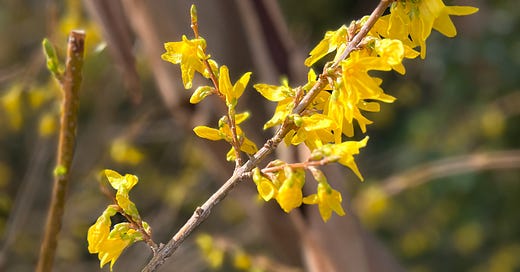Welcome to The Hard Prune!
My name is Dr. Laura Premack, and I launched The Hard Prune in February 2025. I’m an American historian, writer, educator, gardener, meditation teacher and weaver who lives in the northwest of England. When I realised what Trump was doing to my country and the wider world — that it was both as bad as I’d expected and far worse than I’d ever imagined — I wanted to do something.
I decided to start sharing tools, concepts, practices, ideas and resources with people finding their way through these dystopian times. This is the letter I wrote explaining my motivations. There are a lot of (wonderful) people out there telling us how to think about what’s going on and what actions to take. The Hard Prune deals with the emotional side of living with dystopia — how to find ease, how to connect, how to build resilience, how to take breaks.
It’s difficult for me to join my fellow Americans in protest given where I live, but I can offer support from afar to those of you who are out there with your signs and voices. I also want to speak to those of you who are living through this unable (for all sorts of reasons) to do much more than watch it happen. We don’t all have to react to traumatic events in the same way.
I also know well many Brits who feel keenly the destabilising effects of Trumpism while also dealing with the ongoing repercussions of Brexit, austerity, Covid, the war in Ukraine, the events in the Middle East, and more. These are not easy times. I am a naturalised British citizen raising a family here in the UK, and your struggles are mine too.
My vision is to create a transatlantic community of solidarity. As the Hard Prune community grows, I’ll facilitate connection amongst readers, so we can support, encourage, and learn from each other. When I teach seminars, run group-coaching sessions and lead workshops, I harness the wisdom of the group, and, as the Hard Prune community grows, I’ll do that here too.
If you join, you can expect to receive essays in your inbox most Fridays, like this one about equanimity, one of my favourites so far. I promise to do the very best I can to share useful, clear and insightful offerings. I won’t (knowingly) repeat what you can get elsewhere; I will avoid trends and platitudes; and I will unapologetically speak not only to your head but also to your heart. I probably won’t manage to meet you exactly where you are on every given day, but what doesn’t land at first might be useful later, if only to keep in your pocket to share with someone else. We’re all in this together.
I’ll let you know when I start offering other things, like reviews, discussion threads, a book club, interviews, journaling prompts, meditations, Q&As, etc. I intend to offer everything free of charge, so we can build a community open to everyone, though at some point I may reserve a few perks for paid subscribers.
I’m often asked, why do you call it The Hard Prune? In 2019, when I left my academic job (driven out by bullying and corruption that I fought for as long as I could), I trained as a professional gardener. One of the skills I learned was a hard prune. It’s when you cut a plant back nearly to the ground.
Why would you do that? The plant might be too big. It might be diseased. It might simply be failing to flourish. When my forsythia were covered in hard brown burrs like walnut shells and flowered only at the tips while the rest of the blossoms died before they opened, like tiny tissue tears, I pruned those forsythia back so far it was as if they’d never been there at all. I missed them.
But, after a few years with bare spots in my spring garden, the forsythia grew back bigger, wilder, and yellower, with nary a burr in sight, exactly as I’d hoped. Sometimes what feels like destruction is in fact the very opposite: a chance for regrowth. A bud forms, a shoot emerges, a branch extends, a full row of flowers blooms.
In the garden, there are no endings, only cycles.
We are at a difficult point in an ongoing cycle. It won’t always be like this. We will get through this, together. And what seems like the end of something may turn out to be the beginning of something better.




